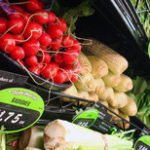
Eating responsibly is a complex and multifaceted issue. It is important not just for improving the environment, but also ensuring quality of life. Responsible eating is part of a healthy lifestyle, which leads to greater vitality and happiness. Here are the 10 most important things to consider when shopping for food.
- Eat locally.
Buy produce that was grown within 100 miles of you, and ideally came from a small, privately owned farm. Food starts to deteriorate as soon as it’s picked, so the further it has traveled the fewer nutrients make it to your plate. Produce that has to travel far is picked too early and ripened with chemicals. Yuck!
Small farms often use water and fuel more efficiently. Plus that food didn’t have to travel by plane, train, and automobile to get to your table.
- Eat seasonally.
Do you crave berries in the summer and pumpkin in the fall? It’s not just social conditioning, it’s the fact that plants and animals have evolved together throughout thousands of seasons! Seasonal produce is healthier for you and takes fewer resources to grow. Yum!
- Eat organic.
Organic-certified foods have met strict USDA standards and have been grown without the use of synthetic fertilizers and pesticides. Fertilizers and pesticides have been found to cause a litany of problems, from birth defects to red tide. Many are Endocrine Disrupting Chemicals (EDCs) that can either mimic hormones or prevent the proper action of hormones in plants and animals. If you can’t afford to buy all organic vegetables, focus on the ‘Dirty Dozen”. These fruits and vegetables have the largest amount of fertilizer and pesticide residue. And if it’s not local and in season, don’t buy it!
Fortunately, here in San Diego organic food is abundant and easily obtainable. There are loads of great Farmers Markets and Farm Stands. My favorite way to get fresh produce is Community Supported Agriculture. CSA programs typically run quarterly, and involve getting a big bag of freshly harvested produce every week. This ensures that it’s local, seasonal, and organic. It is absolutely the healthiest and best tasting food around. Find out about all the farmers markets, farm stands, and CSA programs in the area from the San Diego Farm Bureau.
If you’re looking for other organic products, check out these natural food stores:
2009 S. Coast Hwy
Oceanside, CA 92054
Ocean Beach People’s Organic Food Market
4765 Voltaire St
San Diego, CA 92107
10407 Friars Rd
San Diego, CA 92120
- Eat more fruits & veggies.
Foods higher on the food chain require more energy, water, and other resources to produce. The most efficient diet, measured as the amount of food produced per acre of land, is a low-fat vegetarian diet. Need I even mention the health benefits here? Vegetables fill you up and fuel your body, antioxidants protect you from cancer, and fiber keeps everything running smoothly.
If Americans reduced their beef consumption by one quarter-pound per week, the pollution reduction would equal taking 4 to 6 million cars off the road [*].
- Eat grass-fed beef.
If you do eat beef, make sure it’s grass fed. Cattle naturally graze on grass, so this type of farming helps maintain a natural, healthy ecosystem. The alternative is growing thousands of acres of corn, processing it, storing it, and finally shipping it to the farms to be fed to cows. Corn is not good for cows, however, so infections occur and antibiotics are required.
Grass-fed beef is not only lower overall in fat, but it has a much greater amount of omega-3s.
- Choose fish wisely
Buy small, wild, locally caught fish. The higher up on the food chain an animal is, the more chemicals accumulate in its body over time. Smaller fish are lower on the food chain, and therefore have lower levels of mercury. Wild fish often have more omega fatty acids, and are not treated with antibiotics like their farm-raised counterparts.
- Eat whole foods.
Processed food not only uses up extra resources to produce, but it also strips the food of nutrients. Add the fact that most of these foods are higher in calories and loaded with preservatives, and you have a full on diet disaster. Munch on some apples and walnuts instead. Now you are getting vitamins, fiber, and healthy fats.
- Eat fresh food.
Like processed foods, frozen foods require extra processing and packaging. They also often contain fewer nutrients. Buy fresh fruits and vegetables instead, and don’t forget to bring your reusable bags!
- Reduce waste.
Purchase only the food you can consume before it expires, and compost your waste. The average American household throws away 14% of their food purchases(**). Not only is the food wasted, but also the resources used to grow, package, and transport it. The resulting waste ends up decomposing in a landfill and releasing harmful methane into the atmosphere.
- Create a garden.
It doesn’t get any more local than your own back yard! Starting your garden doesn’t take as much space as you might think, and it will give you something to use that compost for. If you’ve followed my instructions so far, you should be cooking more meals at home. So it would be helpful to have some fresh herbs nearby. If you need help turning your yard into an edible landscape, check out Urban Plantations.
http://www.examiner.com/green-business-in-san-diego/10-ways-to-eat-responsibly






